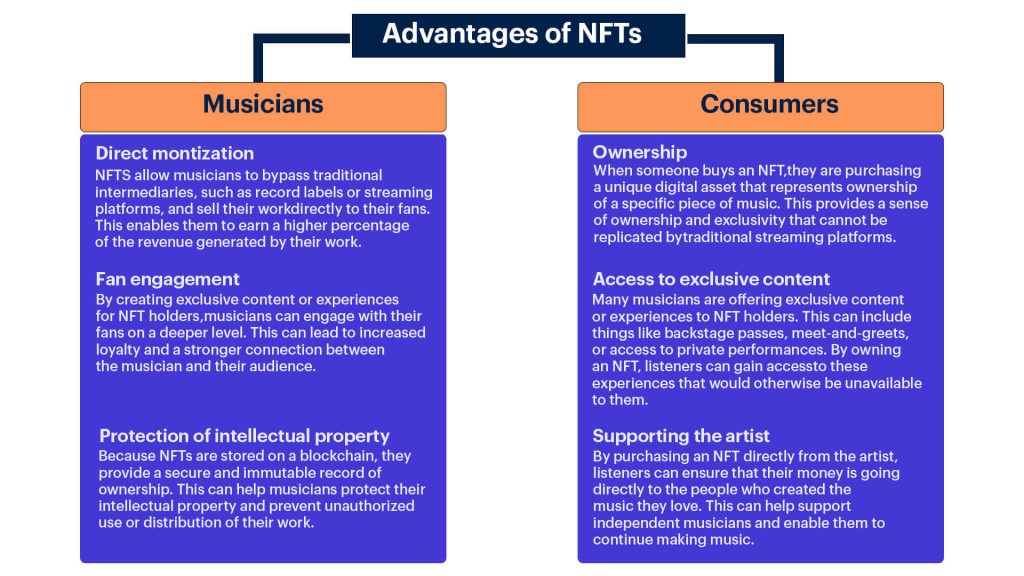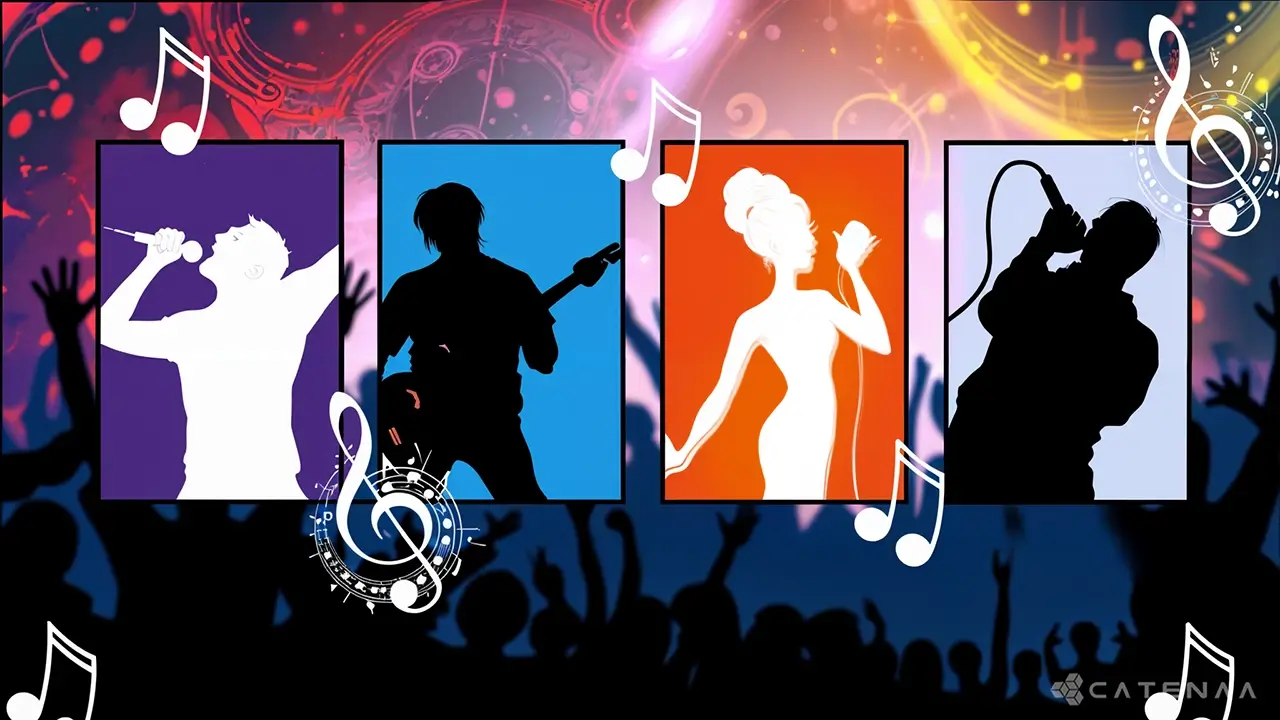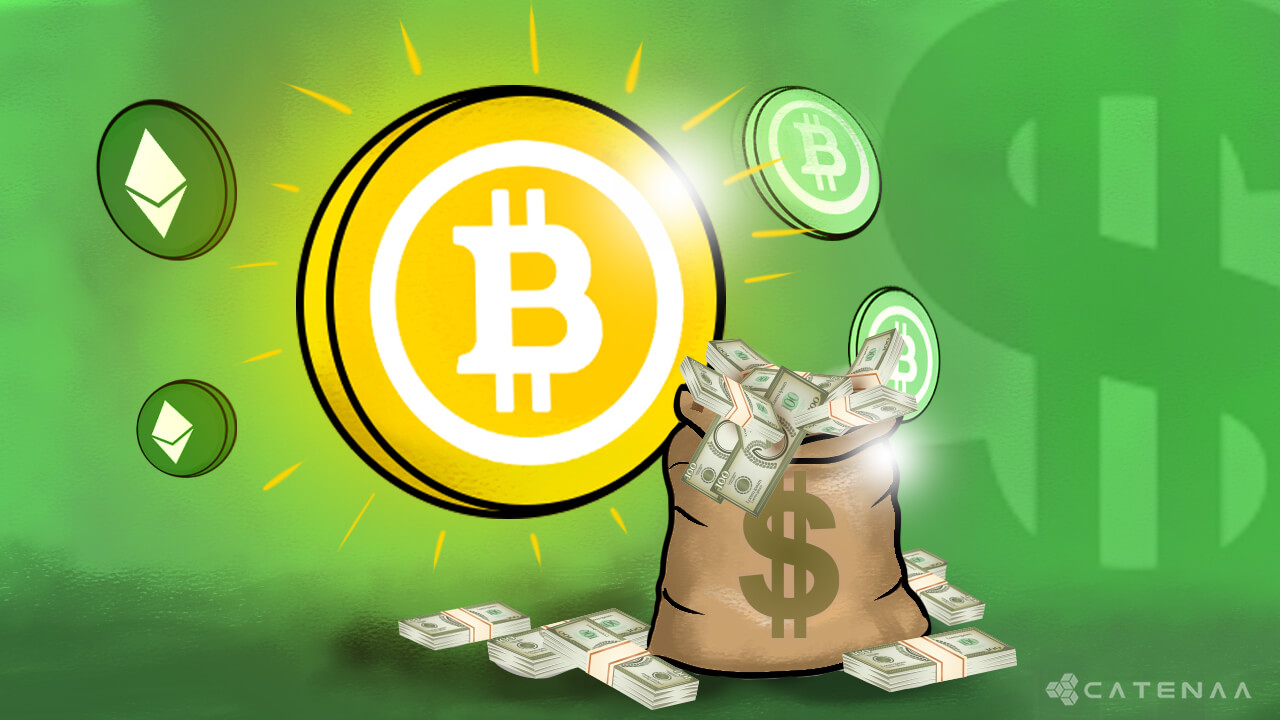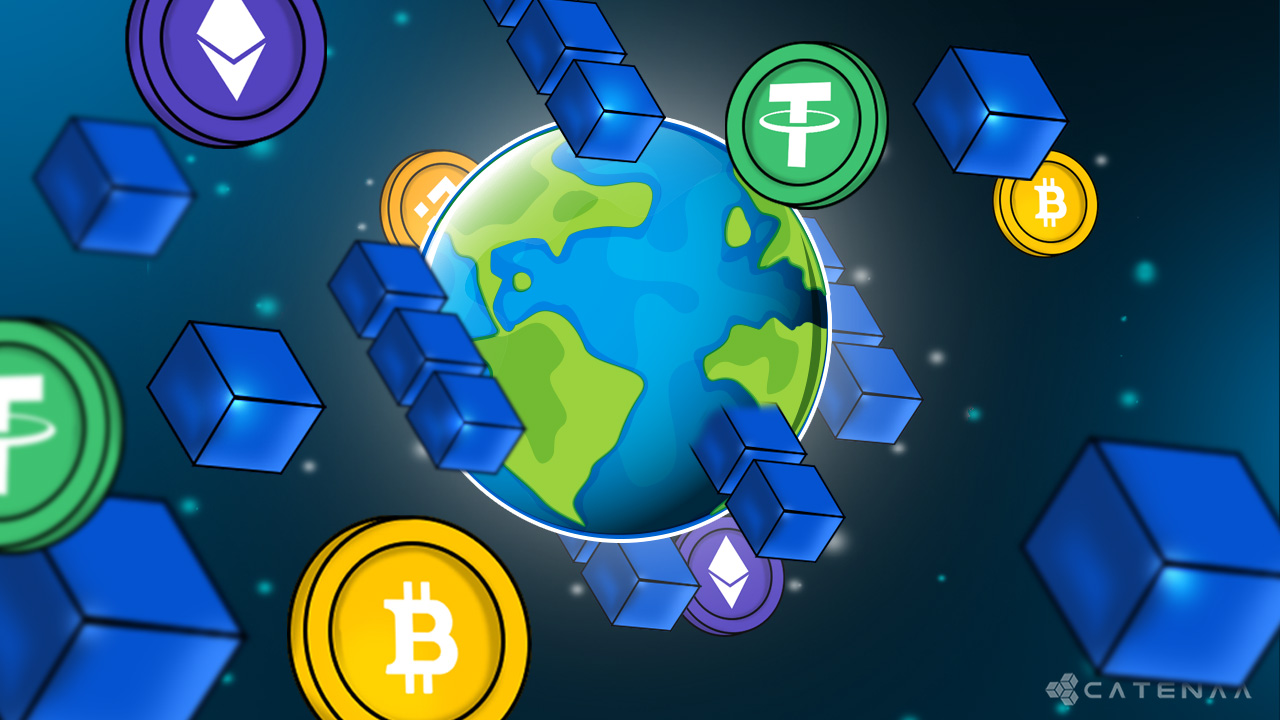From the ancient city of Ugarit (modern-day Syria) to the cathartic melodies of Coldplay, music has been enriching civilization for as long as man could speak. However, the music industry has undergone a significant transformation in recent years. The rise of digital music streaming platforms, such as Spotify and Apple Music, has led to a shift in the way music is consumed. However, despite these changes, many musicians struggle to make a living from their craft, while middlemen rein in the dough. This is where NFTs come in, and they have the ability to decentralize this highly centralized industry and fairly compensate our musicians. This article will explore what NFTs are and how they are transforming the music industry.
Introduction: What are NFTs & How are they created?
NFTs or non-fungible tokens are unique digital assets that are stored on a blockchain. They are different from traditional cryptocurrencies, such as Bitcoin or Ethereum, in that they cannot be exchanged for an equal value. Instead, they represent ownership of a specific digital asset, such as a piece of artwork, a tweet, or a piece of music. Each NFT is unique, and its value is determined by its scarcity and desirability. To create an NFT, the owner of a digital asset, such as a song, album, or video, can mint an NFT on a blockchain platform such as Ethereum. The NFT will include metadata that describes the digital asset, such as its title, artist, and date of creation. This process might sound intimidating for beginners, but this can be easily done through platforms such as OpenSea. Once the NFT is minted, it can be sold or auctioned off to the highest bidder. The buyer of the NFT becomes the owner of the unique digital asset represented by the NFT, and the ownership is recorded on the blockchain to make it permanent.
How it all started…
There is an active debate on who should get the credit for incorporating music with NFTs, and the first is likely to be a virtual festival that took place in 2014 1 , where the tickets were issued as NFTs and purchased using Bitcoin. Fast forward to now, music NFTs have exploded in popularity, with popular musicians such as Snoop Dogg, Eminem, Shawn Mendes, and Whitney Houston (to name a few) embracing this technology and launching their own NFTs.
Exploring Use Cases for NFTs in the Music World
Non-fungible tokens, or NFTs, are the new buzz in the digital world, revolutionizing the way we perceive digital assets. NFTs provide artists and musicians with a new way to monetize their creations, and they are already making a big impact in the music industry. Let’s look at a few use cases for NFTs in the music industry.
Creating unique fan experiences
Artists are using NFTs to create unique fan experiences, such as access to exclusive merchandise, backstage passes, and meet-and-greets. By owning an NFT, fans can gain access to these experiences, which are not available to the general public.
Tokenizing music royalties
NFTs can be used to represent ownership of music royalties. This allows artists to sell a portion of their future royalties to investors in exchange for a lump sum payment. This can be especially useful for up-and-coming artists who need capital to fund their music projects.
Authenticating ownership of music
NFTs can be used to authenticate ownership of music. This can be useful for artists who want to protect their intellectual property and ensure that they are properly compensated for their work. NFTs can also be used to ensure that fans are buying legitimate copies of an artist’s work.
Creating collectibles
NFTs can be used to create digital collectibles, such as limited-edition concert posters, album covers, and even virtual instruments. These collectibles can be traded among fans, creating a new market for music memorabilia.

Challenges and concerns
While music NFTs offer exciting possibilities for the music industry, it is essential to address the challenges and concerns associated with this technology. Here are some of the most significant ones:
Ownership and copyright issues
NFTs allow musicians to sell their music as unique digital assets, but this can create confusion over who actually owns the rights to the music. This can lead to disputes over royalties and other forms of compensation, which can be difficult to resolve. Additionally, some critics argue that NFTs could undermine the existing copyright system by creating a new form of ownership that is difficult to regulate.
Accessibility issues
While NFTs can provide a new revenue stream for musicians, they can also be expensive and difficult for some fans to obtain. This can create a divide between those who can afford to purchase NFTs and those who cannot, potentially excluding certain fans from participating in the music industry.
Environmental concerns
One of the major concerns surrounding music NFTs is their environmental impact. The process of creating an NFT requires a significant amount of energy, which can contribute to carbon emissions and climate change. Although with innovative consensus mechanisms such as proof-of-stake, blockchains have become more eco-friendly, and these concerns will no longer be valid.
Volatility of the NFT market
NFT prices can be highly volatile and subject to rapid fluctuations, which can make it difficult for musicians to predict their earnings and plan for the future. This can also create a speculative market where prices are driven by hype rather than the actual value of the music.
Exploring the Growing Market for NFT Music
The NFT music market can be broadly divided into two categories. The first is Web3 streaming services, and the latter is NFT marketplaces. Let’s look at each of these individually. 2
Web3 streaming services
Web3 streaming services are a new generation of music streaming platforms that leverage blockchain technology to offer unique features such as transparency, ownership, and creator rewards. Here are some popular examples of Web3 streaming services:
Audius music
Audius is a decentralized music streaming platform that allows artists to upload their music directly to the platform without the need for intermediaries. It also offers a token-based system that rewards artists and fans for participating in the platform and allows fans to support their favorite artists through tips and donations.
Emanate
Emanate is a blockchain-powered streaming platform built on EOSIO. It uses the EMT token and its internal stable coin (EOSDT) for payment. Emanate is unique compared to the other services in the sense that it pays artists in its native token per stream.
Opulous
Opulous is a music streaming platform that uses blockchain technology to offer a decentralized infrastructure for music distribution and monetization. It allows artists to monetize their music by selling shares of their catalog to fans and also offers a range of features such as fractional ownership and revenue sharing.
Resonate
Resonate is a community-owned music streaming platform that offers a cooperative business model where artists and fans share ownership of the platform. It also offers a range of features such as transparent payments, fair royalties, and user-centric governance.
NFT marketplaces
As the market for music-related NFTs continues to grow, several platforms and services are now offering NFT marketplaces catered specifically to the music industry. In contrast, other popular NFT platforms, such as OpenSea and Rareible, can also be used. Now let’s look at some of the best Music-specific NFT marketplaces,
NiftyMusic
NiftyMusic is an NFT marketplace for music that allows musicians to create and sell digital collectibles such as limited-edition albums, concert tickets, and merchandise. It also offers features such as social media integration and smart contracts to ensure transparency and security for buyers and sellers.
Catalog
Catalog is a platform that allows musicians and labels to create and sell NFTs of their music. It also offers a range of features such as smart contracts, royalties, and a customizable storefront.
Royal
Royal is an NFT marketplace for music that allows artists to monetize their work by selling digital assets such as albums, singles, and concert tickets. It also offers features such as fan engagement tools and social media integration.
Fanaply
Fanaply is a platform that offers NFTs for music events and festivals. It allows fans to purchase unique digital collectibles such as tickets, badges, and merchandise, as well as offering exclusive experiences such as meet and greets and backstage passes.
The Future of NFTs in the Music Industry
NFTs offer a new way for musicians to monetize their work and engage with their fans. By providing a sense of ownership and exclusivity, they offer listeners a new way to connect with the music they love. However, there are also concerns about their impact on the environment and the potential for misuse. As with any new technology, it is important to consider both the benefits and the risks before fully embracing it. That being said, NFTs offer new avenues for the music industry that were not available before, and it’ll be exciting to see how this technology matures and grows.
- tunedly tunedly.com[↩]
- NFTnow: nftnow.com[↩]


